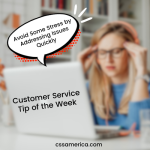A recent study highlighted in the Sacramento Bee (Good Customer Service is Key to Capturing Holiday Shoppers) addressed the impact of customer service on customer loyalty (or disloyalty). Results included:
· 29% stopped shopping at retail stores because of a bad shopping experience
· 71% avoid certain brick-and-mortar retail stores due to unhelpful/unfriendly employees
· 41% stop patronizing a business because of long lines or long wait time.
So it’s about the experience, the people, the processes.
But what’s even more interesting about the results is this conclusion – to improve retention, simply address the reasons why people leave.
While many organizations focus on creating the “WOW” experience or transforming your employees into Disney “Cast Members” or creating a Zappos culture, what is more tangible and provides more bang for the buck is finding out why customers leave.
So research. Interview former customers, or ask current ones why they’d leave. Know why they’d go, eliminate those loss reasons, and watch sales grow.
To become great at customer loyalty, increase your knowledge of why they’d leave…and act on it.
Read our New Book – “Ask Yourself…Am I GREAT at Customer Service?” http://www.amigreatat.com/
Listen to our latest podcast episode of “Stepping Up Service” on The MESH Network at http://themesh.tv/stepping-up-service/
Interested in improving your company’s customer service? See more at our new website! http://www.cssamerica.com/





















